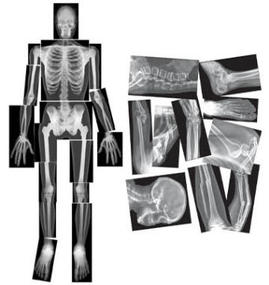|
How is your body broken? Count your scars, wounds, and imperfections. Injuries, glasses, bad back, twisted ankle, or allergies. Or maybe things are not as you want them: crooked teeth, braces, big nose, a little extra weight here and there, too short or too tall. Or maybe you're experiencing the decline associated with age: loss of strength and sharpness of thought, wrinkles, gray hair, hearing loss. Or maybe serious maladies like cancer, heart disease, or diabetes. Or maybe mental illness, depression, a bodily addiction. There are so many ways the body can be broken. The fact of the matter is that we all have broken bodies. What do we do with our broken bodies? As a pastor, I get to see many different hospitals and medical facilities. I can tell you that health care is big business. In the recent economic recession, most new construction stopped. Who kept one building? Major medical centers. As our national demographics age, our investment in health care increases dramatically. All to fix our broken bodies. And yet no drug, no surgery, and no botox shot will remedy the fact that every body will break.
So the question remains, “What do we do with our broken bodies?” Certainly, we take care of them as creations of the Creation, as gifts from God. You're the "general manager" of your body. Eat well. Exercise. Develop healthy habits. But these aren't final answers to a broken body. So what happens when we’ve done all we can, and bodily brokenness still overtakes us? What happens when you take all your vitamins and all your prescriptions? What happens when you’ve tried every diet and exercise program? What happens when you had the surgery and you still hurt? What happens when the doctors have exhausted every option? What happens when medicine has no answer? Even worse, what happens when you’ve prayed incessantly for a broken body to be healed? You’ve prayed to God, but you’re still broken. Paul was plagued by some sort of physical malady. We’re not quite sure what it was, but he called it a “thorn in the flesh.” He said, “To keep me from becoming conceited because of these surpassingly great revelations, there was given me a thorn in my flesh, a messenger of Satan, to torment me” (II Cor. 12:7). He prayed repeatedly for this physical oppression to be taken away. But his broken body was not healed. In fact he believed this “thorn” was “given” to him. This seems incredibly cruel. Why would God give him this? In his broken body, Paul heard something from God. In fact, without his “thorn in the flesh,” he may not have heard it. Paul said, “But he (God) said to me, "My grace is sufficient for you, for my power is made perfect in weakness." Therefore I will boast all the more gladly about my weaknesses, so that Christ's power may rest on me.” (II Cor. 12:8-10). In Paul’s broken body, God said, “My grace is enough. It’s all you need. Your identity is not in how strong you are or how good you look. I want you to see that what I give you is enough.” The question we often ask is, “How do I fix my brokenness? How do I get rid of it?” Paul hints at a different question: “What can God do with my brokenness?” What is he saying? Teaching? Building? Showing? Please don’t hear me trivialize your pain. Some of you have, or are, suffering great physical brokenness. I am not dismissing its severity. IT HURTS! The cross doesn't tell us that suffering is good, but it does show that suffering is a place for God’s power. A broken body is a work zone for God. What is he building? Watch and listen. After he has taken all other power sources away. After he has removed all crutches. After he has reduced you and humbled you. Then you’ll really see, “My grace is sufficient for you. My power is made perfect in weakness.” Comments are closed.
|
JOIN My Tribe
|



